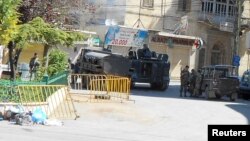BEIRUT —
Lebanon’s militant Shi'ite group Hezbollah established dozens of checkpoints this summer in Beirut and other Lebanese cities after a series of bombings targeted their followers. But with Sunni resentment mounting over the security arrangements, Hezbollah unexpectedly has backed down.
This week the Lebanese army took control of Hezbollah checkpoints in the Bekaa Valley town of Baalbek following sectarian clashes. This is not the first time the militant Shi'ite group has handed over checkpoints to the country’s official security forces.
In the summer, Hezbollah set up checkpoints in Beirut and other cities in the wake of a series of car bombings that targeted their followers in the Shi'ite-dominated southern suburbs of the country’s capital.
The bombings were apparent reprisals for Hezbollah’s military support of President Bashar al-Assad in the Syrian civil war raging next door.
Lebanese Sunnis resented the Hezbollah checkpoints, claiming the security measures proved that the militant group sees itself as a state-within-the-state.
For critics of Hezbollah, like Lebanese author Michael Young, the militant and political group was just using its claimed special status as a resistance force against Israel to parade its weapons and autonomy.
“Because a resistance force essentially, implicitly gives the party the right to be above the Lebanese state, not to submit to the rules of the Lebanese state, not to accept that the monopoly over weapons should only be held by the state and the armed forces. It has tried to integrate into the state. But at the same time it has retained always a prized position for itself outside the system,” says Young.
Syria support at issue
But Hezbollah has been handing over its checkpoints even in southern Beirut to the Lebanese army, saying it wants to avoid being dragged into conflict with Lebanon’s Sunnis who back the rebels in Syria. The Sunnis have been angered by Hezbollah’s support of Assad and episodic albeit deadly sectarian clashes in Lebanon have broken out.
Lebanon has been on edge since spring when Hezbollah took a prominent role in Syria - a move that upset the delicate political and religious balance in Lebanon. Christians and Sunni and Shi'ite Muslims have maintained a fragile truce since ending a bloody civil war of their own 23 years ago.
Over the weekend, gun-battles erupted in Baalbek between Shi'ite militiamen and a prominent Sunni family, sparked partly because of a Hezbollah checkpoint.
Retired Lebanese army general Hisham Jaber says that Hezbollah is determined to contain sectarian strife in Lebanon, fearing the consequences of an all-out conflict erupting. And the group is being careful, he says, not to antagonize the Lebanese army, despite the fact Hezbollah is likely the more powerful force.
“Hezbollah was smart enough not to create any hurt or conflict with the army. They are very wise to keep a distance from the army and to create a kind of coordination in order not to have any conflict,” says Jaber.
No one is expecting Hezbollah to surrender its vast weapons arsenal, but the abandoning of checkpoints has offered Lebanese some hope that maybe they can avoid a full-blown sectarian conflict.
This week the Lebanese army took control of Hezbollah checkpoints in the Bekaa Valley town of Baalbek following sectarian clashes. This is not the first time the militant Shi'ite group has handed over checkpoints to the country’s official security forces.
In the summer, Hezbollah set up checkpoints in Beirut and other cities in the wake of a series of car bombings that targeted their followers in the Shi'ite-dominated southern suburbs of the country’s capital.
The bombings were apparent reprisals for Hezbollah’s military support of President Bashar al-Assad in the Syrian civil war raging next door.
Lebanese Sunnis resented the Hezbollah checkpoints, claiming the security measures proved that the militant group sees itself as a state-within-the-state.
For critics of Hezbollah, like Lebanese author Michael Young, the militant and political group was just using its claimed special status as a resistance force against Israel to parade its weapons and autonomy.
“Because a resistance force essentially, implicitly gives the party the right to be above the Lebanese state, not to submit to the rules of the Lebanese state, not to accept that the monopoly over weapons should only be held by the state and the armed forces. It has tried to integrate into the state. But at the same time it has retained always a prized position for itself outside the system,” says Young.
Syria support at issue
But Hezbollah has been handing over its checkpoints even in southern Beirut to the Lebanese army, saying it wants to avoid being dragged into conflict with Lebanon’s Sunnis who back the rebels in Syria. The Sunnis have been angered by Hezbollah’s support of Assad and episodic albeit deadly sectarian clashes in Lebanon have broken out.
Lebanon has been on edge since spring when Hezbollah took a prominent role in Syria - a move that upset the delicate political and religious balance in Lebanon. Christians and Sunni and Shi'ite Muslims have maintained a fragile truce since ending a bloody civil war of their own 23 years ago.
Over the weekend, gun-battles erupted in Baalbek between Shi'ite militiamen and a prominent Sunni family, sparked partly because of a Hezbollah checkpoint.
Retired Lebanese army general Hisham Jaber says that Hezbollah is determined to contain sectarian strife in Lebanon, fearing the consequences of an all-out conflict erupting. And the group is being careful, he says, not to antagonize the Lebanese army, despite the fact Hezbollah is likely the more powerful force.
“Hezbollah was smart enough not to create any hurt or conflict with the army. They are very wise to keep a distance from the army and to create a kind of coordination in order not to have any conflict,” says Jaber.
No one is expecting Hezbollah to surrender its vast weapons arsenal, but the abandoning of checkpoints has offered Lebanese some hope that maybe they can avoid a full-blown sectarian conflict.




